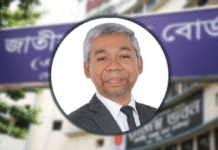
Former interim government adviser Wahiduddin Mahmud, former Bangladesh Bank governor Mohammed Farashuddin, Dhaka University professor MA Taslim, General Economics Division member Shamsul Alam, former finance secretary Mohammad Tareque and World Bank Bangladesh lead economist Zahid Hussain are present, among others, at the closing session of BIDS Research Almanac 2018 at Lakeshore Hotel in Dhaka on Monday. — New Age photo
Economists on Monday identified irregularities in the financial sector and lack of good governance as the main challenges that the next government would face in pressing forward Bangladesh economy.
In the closing session of BIDS Research Almanac 2018 titled ‘The Development Outlook – Key Messages for the Next Government’, they also suggested that the government check corruption and make investment in human capital for achieving required economic growth in future.
‘It’s very much unfortunate that country’s banking sector is infested with scams and there is a relation of capital flights with the irregularities in the banking sector,’ former interim government adviser Wahiduddin Mahmud said while addressing the session as chief guest at Lakeshore Hotel in capital Dhaka.
Citing the theory of ‘path dependence’, he said if the tools, which were used to protect anomalies, became weak, the irregularities would increase gradually.
‘The government has formulated Delta Plan; it’s a very good initiative but you have to ensure good governance to implement the plan,’ the economist said.
If Bangladesh destroys its existing rivers and forests, the 100-year Delta Plan would not bring any positive result, Wahiduddin said.
It will not be possible to eradicate poverty in the country if capital flights continue, he said.
Wahiduddin said that the present government had approved a good number of projects ahead of the national elections and the next government should evaluate the merit of those projects.
He also suggested that the government make the data of inflation and per capita income more transparent.
‘All the governments of Bangladesh provided unethical financial benefits to their party members under political consideration and at the same time the governments adopted welfare projects for the people. This is the paradox of the Bangladesh economy,’ he said.
Wahiduddin emphasised investment in productivity saying that training of workers and innovation were must for achieving higher economic growth.
World Bank Bangladesh lead economist Zahid Hussain said volatility in the foreign exchange market and financial sector were the short-term challenges for Bangladesh.
He said the economy of Bangladesh was on the middle-income highway but the vehicle needed refuelling and the highway itself needed some refurbishment.
Zahid said, ‘The global economy is robust, still there are some clouds on the horizon. Growth is moderating, trade is slowing and financial conditions are tightening.’
He said that the tariff escalation by the US might create short-term opportunities for emerging economic countries including Bangladesh depending how they were able to use their supply capacity to take advantage of the relocation of orders from China.
Former Bangladesh Bank governor Mohammed Farashuddin said that there was no alternative to making investment in human capital development to face the future economic challenges.
He said that the trade war between the US and China had created an opportunity for Bangladesh to be benefited in the global export market.
‘If we want to tap the opportunity, we have to invest in manpower as Chinese businesses express keen interest for joint venture in Bangladesh,’ Farashuddin said.
Former finance secretary Mohammad Tareque said that the government should invest in education and health as today’s children would play a major role in economy for next 30-40 years.
‘Inequality and corruption are increasing in the society and the government should not let them go unchecked,’ he said.
Source: New Age.









